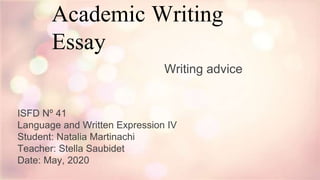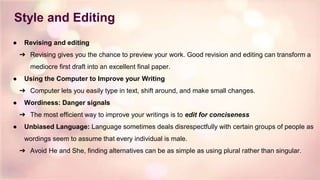The document provides advice on various aspects of academic writing such as planning, organizing, reading, researching, using sources, specific writing types, style and editing. Some key points covered include:
- Planning an essay involves formulating a question, developing a thesis, and organizing arguments clearly.
- Critical reading involves determining claims, context, evidence and evaluating strengths and weaknesses. Notes should be labeled for later use.
- Sources must be properly cited to avoid plagiarism. Quotations should not overcrowd your own ideas.
- Different writing types have distinct goals and organizations such as explaining a topic for the public or asking a historical question.
- Revising, concise writing, unbiased language, proper punctuation



















